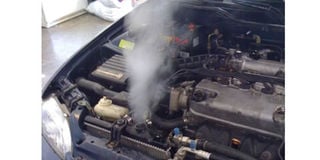Why your radiator cap may burst

What you need to know:
- The cap, he explains, does not only prevent the coolant from leaking but maintains the required radiator water pressure to keep it running sufficiently.
- Justus Kiryowa also advises to always ensure that the radiator is unclogged to avoid blockage of water movement.
However, he cautions that the radiator should only be unclogged after the car has cooled.
As he drove home from work about two weeks ago, Eric Kiyonga saw a layer of smoke permeate through the bonnet area.
His mind raced fast to the exhaust pipe but he soon realised it was smoke mixed with a bit of mist.
Therefore, it could not have been coming from the exhaust pipe.
“Before I could open the bonnet, I heard a loud burst. I thought it was coming from the engine. But when I opened, I realised there had been a leakage from the radiator and the pressure from within had forced the cup to burst open,” Kiyonga recalls.
Radiator damage is a serious mechanical problem that has the potential to bring the engine to an immediate halt.
In his assessment, Sula Kilimani, a mechanic in Kisekka Market, downtown Kampala, Kiyonga’s radiator switch had developed mechanical problems and it needed replacing.
“The water in the radiator had become extremely hot and it exerted a lot of pressure on the radiator cap,” he says.
When a car radiator bursts its cap open, it is an indication of a larger problem, which according to Kilimani, must immediately be repaired before you resume driving lest you cause more damage.
“Such a radiator will overheat the engine thus damaging the engine cylinder head. This might lead to the car stalling. The best option is to park on the roadside side or switch off the engine and push the car to the nearest repair point,” he says.
In mechanical speak; engine stalling is when the car engine comes to a sudden halt.
According to Justus Kiryowa, a mechanic at KJ Motor Garage in Ggaaba, a leaking radiator will cause the car to overheat and will bring serious damage to the engine and other parts.
Radiator damage, Kiryowa says is not something that most drivers think about or regularly inspect but it is important to understand how it works and how it can affect the car.
“If you are a rough driver who hits potholes and humps, the up and down rough movement affects the radiator by causing cracks thus causing leakages,” he says.
How to prevent radiator cap burst
According to Sula Kilimani, a mechanic, rather than wait for the radiator to burst when you are on the road, have it inspected and your mechanic should be able to advise on the extent of the cracks or whether to have it replaced immediately.
A radiator crack, he says, can be repaired if it is manageable but there are certain sensitive cracks that cannot be repaired which calls for replacement of the entire radiator to prevent more complicated damage and repairs.
Just like how a water jerrican will leak when not tightened, the radiator cap, according to Kilimani will also leak. This, therefore, demands that the radiator cap is always fastened.
The cap, he explains, does not only prevent the coolant from leaking but maintains the required radiator water pressure to keep it running sufficiently.
Justus Kiryowa also advises to always ensure that the radiator is unclogged to avoid blockage of water movement.
However, he cautions that the radiator should only be unclogged after the car has cooled.




